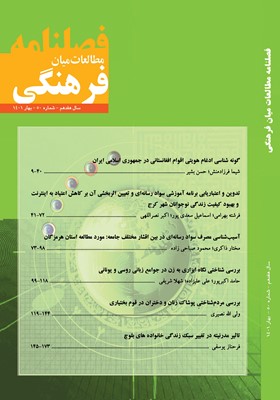بررسی شناختی نگاه ابزاری به زن در جوامع زبانی روسی و یونانی
محورهای موضوعی : مطالعات میان فرهنگیحامد اکبرپور 1 , علی علیزاده 2 , شهلا شریفی 3
1 - دانشجوی دکتری، گروه زبان شناسی، دانشگاه فردوسی مشهد،مشهد، ایران
2 - دانشیار، گروه زبان شناسی ،دانشگاه فردوسی مشهد،مشهد ، ایران
3 - دانشیار، گروه زبان شناسی، دانشگاه فردوسی مشهد، مشهد، ایران
کلید واژه: زبانشناسی شناختی, زبانشناسی فرهنگی, زبان روسی, زبان یونانی, ابزارانگاری زن, جنس دستوری,
چکیده مقاله :
هدف از انجام این پژوهش بررسی و مقایسۀ شناختی فاصلۀ فرهنگی دو جامعۀ زبانی نامتجاور روسیه و یونان در میزان نگاه ابزاری به زن از دیدگاه زبانشناسی فرهنگی است. برای این منظور 330 ابزارواژۀ رایج در فهرست جامع آلمانی در این دو زبان معادلیابی شده و سپس بسامد جنس دستوری مؤنث در آنها به مثابه یک شاخص در چهارچوب نظری تحقیق استحصال گردید. نتایج آزمون کایدو با سطح معنیداری 0/416 نشان میدهد که اختلاف بین دو بسامد معنیدار نیست اما کماکان وجود دارد و جنس دستوری مؤنث در ابزارواژگان یونانی بیشتر از روسی است. معنادار نبودن این اختلاف را میتوان در تقارب فرهنگی مبتنی بر بنیادهای مذهبی مشترک، سرایت مفهومسازیهای فرهنگی یونانی به روسیه، اشتراکات ابعاد فرهنگی هوفاستیده و نزدیکی ارزشهای بنیادین انسانی یافت و بازنمایی وجود این اختلاف را در قوانین مربوط به تنفروشی زنان و شاخص فرهنگی بیبندباری مشاهده کرد که بر این اساس نگاه ابزاری به زن میان روسیزبانان روسیه کمتر از یونانیزبانان یونان بهدست داده شد.
The purpose of this study is to study and cognitively compare the cultural distance between the two non-adjacent language communities of Russia and Greece in terms of instrumental view towards women from the perspective of cultural linguistics. For this purpose, 330 common tool-words in the comprehensive German list were equated into these two languages and then the frequency of feminine grammatical gender in them was extracted as an indicator in the theoretical framework of the research. The results of the Chi-square test with a significance level of 0.416 show that the difference between the two frequencies is not significant but still exists and the feminine grammatical gender in Greek tool-words is more than Russian. The insignificance of this difference can be found in the cultural convergence based on common religious foundations, the spread of Greek cultural conceptualizations to Russia, the commonalities of Hofstede’s cultural dimensions and the proximity of basic human values. On the basis of this study, the instrumental view towards women among Russians is less than the Greek.
اکبرپور، حامد، علیزاده، علی، شریفی، شهلا (1400). بررسی شناختی تفاوت نگاه ابزاری به زن در جوامع دارای زبان های خواهر از دیدگاه زبان شناسی فرهنگی؛ مطالعۀ موردیِ فرانسه و ایتالیا»، فصلنامه زن و جامعه، در دست انتشار.
کامیابی گل، عطیه، شریفی، شهلا، اکبرپور، حامد (1398). جنسیت زدگی و شناخت نسبت جنس دستوری با مقوله های فرهنگی در زبان های آلمانی و روسی از دیدگاه زبان شناسی فرهنگی»، زن در فرهنگ و هنر، 11(4 )
کلیف تسوا، سوفیا دمیتری یِونا (1383) فرهنگ روسی به فارسی، تهران، جاودان خرد.
Allsop, James (2016), “Values in Law: How they Influence and Shape Rules and the Application of law”. 2016 Hochelaga Lecture; Centre for Comparative and Public Law; Faculty of Law; University of Hong Kong.
Alvanoudi, Angeliki (2014), Grammatical Gender in Interaction: Cultural and Cognitive Aspects. Leiden: Brill.
Cohn, Ronald & Russel, Jesse (2015), Hofstede's Cultural Dimensions Theory. Norderstedt: Books on Demand.
Corbett, Greville G (1982), “Gender in Russian: An Account of Gender Specification and its Relationship to declension”. Russian Linguistics 6. pp. 197-232.
Dworkin, Andrea (1993), “Prostitution and Male Supremacy”. Michigan Journal of Gender & Law. Volume 1 Issue 1.
Evsyukova, T.V. Barabanova, I.G.; Glukhova, O.V. & Cherednikova, E.A (2018), “The Role of Greek Culture --------Representation in SocioEconomic Development of the Southern -Regions of Russia”. European
Research Studies Journal, Volume XXI, Special Issue 1, 136-147
Fuchs, Catherine & Robert, Stéphane. (1999), Language Diversity and Cognitive Representations. Amsterdam: John Benjamins Publishing.
Hofstede, Geert (2001), Culture's Consequences: Comparing Values, Behaviors, Institutions and Organizations Across Nations. Thousand
Oaks: Sage Publications, Inc.
Morwood, James & Taylor, John (2002), Pocket Oxford Classical Greek Dictionary. New York: Oxford University Press Inc.
Nicoladis, Elena., Da Costa, Natalie. & Foursha-Stevenson, Cassandra (2016), “Discourse Relativity in Russian-English Bilingual Preschoolers’ Classification of Objects by Gender”. International Journal of Bilingualism 20 (I). pp. 17-29.
Palmer, Gary B (1996), Toward a theory of Cultural Linguistics.Austin: University of Texas Press.
Palmer, S (1978), “Fundamental aspects of cognitive representation”. In E.
Pavlidou, T. & Alvanoudi, A (2019), “Conceptualizing the world as ‘female’ or ‘male’: Further remarks on grammatical gender and speakers’ cognition”. Selected Papers on Theoretical and Applied Linguistics, Vol 23.
Purcell, L. Edward (1995), Immigration. Westport: Greenwood Publishing Group.
Ramsey, W (2007), Representation reconsidered. Cambridge: Cambridge University Press.
Reinschmidt, Lena (2016), “Prostitution in Europe between regulation and prohibition Comparing legal situations and effects”. Observatory for Sociopolitical Developments in Europe; Working Paper Nr. 13.
Accessible At: https://beobachtungsstellegesellschaftspolitik.de/f/52b9df1667.pdf in https://sociopoliticalobservatory.eu/publications/.
Scheller-Boltz, Dennis (2017), The Discourse on Gender Identity in Contemporary Russia: An Introduction with a Case Study in Russian Gender Linguistics. Hildesheim: Georg Olms Verlag.
Sharifian, Farzad (2017), Cultural Linguistics. Amsterdam; Philadelphia: John Benjamins Publishing Company.
Tatarko, Alexander N.; Mironova, Anna A.; Gari, Aikaterini & van de Vijver, Fons J. R (2020), “The Relationship Between Human Values and Acceptability of Corruption in Russia and Greece”. Psychology in Russia.
State of the Art . 2020, Vol. 13 Issue 3, 79-95. 17.
Unterbeck, Barbara; Rissanen, Matti; Nevalainen,Terttu & Saari, Mirja (2011), Gender in Grammar and Cognition. Berlin: Walter de Gruyter.


